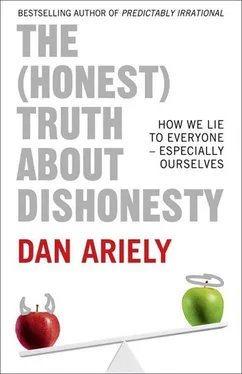Ariely, Dan - The (Honest) Truth About Dishonesty - How We Lie to Everyone – Especially Ourselves
Здесь есть возможность читать онлайн «Ariely, Dan - The (Honest) Truth About Dishonesty - How We Lie to Everyone – Especially Ourselves» весь текст электронной книги совершенно бесплатно (целиком полную версию без сокращений). В некоторых случаях можно слушать аудио, скачать через торрент в формате fb2 и присутствует краткое содержание. Жанр: Старинная литература, на английском языке. Описание произведения, (предисловие) а так же отзывы посетителей доступны на портале библиотеки ЛибКат.
- Название:The (Honest) Truth About Dishonesty: How We Lie to Everyone – Especially Ourselves
- Автор:
- Жанр:
- Год:неизвестен
- ISBN:нет данных
- Рейтинг книги:4 / 5. Голосов: 1
-
Избранное:Добавить в избранное
- Отзывы:
-
Ваша оценка:
- 80
- 1
- 2
- 3
- 4
- 5
The (Honest) Truth About Dishonesty: How We Lie to Everyone – Especially Ourselves: краткое содержание, описание и аннотация
Предлагаем к чтению аннотацию, описание, краткое содержание или предисловие (зависит от того, что написал сам автор книги «The (Honest) Truth About Dishonesty: How We Lie to Everyone – Especially Ourselves»). Если вы не нашли необходимую информацию о книге — напишите в комментариях, мы постараемся отыскать её.
The (Honest) Truth About Dishonesty: How We Lie to Everyone – Especially Ourselves — читать онлайн бесплатно полную книгу (весь текст) целиком
Ниже представлен текст книги, разбитый по страницам. Система сохранения места последней прочитанной страницы, позволяет с удобством читать онлайн бесплатно книгу «The (Honest) Truth About Dishonesty: How We Lie to Everyone – Especially Ourselves», без необходимости каждый раз заново искать на чём Вы остановились. Поставьте закладку, и сможете в любой момент перейти на страницу, на которой закончили чтение.
Интервал:
Закладка:
When Nisbett and Wilson questioned each participant about the rationale behind her choice, not one cited the placement of the stockings on the table. Even when the researchers told the women that all the stockings were identical and that there was simply a preference for the right-hand pair, the women “denied it, usually with a worried glance at the interviewer suggesting that they felt either that they had misunderstood the question or were dealing with a madman.”
The moral of this story? We may not always know exactly why we do what we do, choose what we choose, or feel what we feel. But the obscurity of our real motivations doesn’t stop us from creating perfectly logical-sounding reasons for our actions, decisions, and feelings.
YOU CAN THANK(or perhaps blame) the left side of your brain for this incredible ability to confabulate stories. As the cognitive neuroscientist Michael Gazzaniga (a professor at the University of California, Santa Barbara) puts it, our left brain is “the interpreter,” the half that spins a narrative from our experiences.
Gazzaniga came to this conclusion after many years of research with split-brain patients, a rare group whose corpora callosa—the largest bundle of nerves connecting our brain’s two hemispheres—had been cut (usually as a way to reduce epileptic seizures). Interestingly, this brain abnormality means that these individuals can be presented with a stimulus to one half of the brain without the other half having any awareness of it.
Working with a female patient who had a severed corpus callosum, Gazzaniga wanted to find out what happens when you ask the right side of the brain to do something and then ask the left side (which has no information about what is going on in the right side) to provide a reason for that action. Using a device that showed written instructions to the patient’s right hemisphere, Gazzaniga instructed the right side of the patient’s brain to make her laugh by flashing the word “laugh.” As soon as the woman complied, he asked her why she had laughed. The woman had no idea why she laughed, but rather than responding with “I don’t know,” she made up a story. “You guys come up and test us every month. What a way to make a living!” she said. Apparently she had decided that cognitive neuroscientists were pretty amusing.
This anecdote illustrates an extreme case of a tendency we all have. We want explanations for why we behave as we do and for the ways the world around us functions. Even when our feeble explanations have little to do with reality. We’re storytelling creatures by nature, and we tell ourselves story after story until we come up with an explanation that we like and that sounds reasonable enough to believe. And when the story portrays us in a more glowing and positive light, so much the better.
Cheating Myself
In a commencement speech at Cal Tech in 1974, the physicist Richard Feynman told graduates, “The first principle is that you must not fool yourself—and you are the easiest person to fool.” As we have seen so far, we human beings are torn by a fundamental conflict—our deeply ingrained propensity to lie to ourselves and to others, and the desire to think of ourselves as good and honest people. So we justify our dishonesty by telling ourselves stories about why our actions are acceptable and sometimes even admirable. Indeed, we’re pretty skilled at pulling the wool over our own eyes.
Before we examine in more detail what makes us so good at weaving self-glorifying tales, allow me to tell you a little story about how I once (very happily) cheated myself. Quite a few years ago (when I was thirty), I decided that I needed to trade in my motorcycle for a car. I was trying to decide which car would be the perfect one for me. The Internet was just starting to boom with what I’ll politely call “decision aids,” and to my delight I found a website that provided advice for purchasing cars. The website was based on an interview procedure, and it presented me with a lot of questions that ranged from preferences for price and safety to what kind of headlights and brakes I wanted.
It took about twenty minutes to answer all the questions. Each time I completed a page of answers, I could see the progress bar indicating that I was that much closer to discovering my personalized dream car. I finished the final page of questions and eagerly clicked the “Submit” button. In just a few seconds I got my answer. What was the perfect car for me? According to this finely tuned website, the car for me was … drum roll, please … a Ford Taurus!
I confess that I did not know much about cars. In fact, I know very little about cars. But I certainly knew that I did not want a Ford Taurus. *
I’m not sure what you would do in such a situation, but I did what any creative person might do: I went back into the program and “fixed” my previous answers. From time to time I checked to see how different answers translated into different car recommendations. I kept this up until the program was kind enough to recommend a small convertible—surely the right car for me. I followed that sage advice, and that’s how I became the proud owner of a convertible (which, by the way, has served me loyally for many years).
This experience taught me that sometimes (perhaps often) we don’t make choices based on our explicit preferences. Instead, we have a gut feeling about what we want, and we go through a process of mental gymnastics, applying all kinds of justifications to manipulate the criteria. That way, we can get what we really want, but at the same time keep up the appearance—to ourselves and to others—that we are acting in accordance with our rational and well-reasoned preferences.
Coin Logic
If we accept that we frequently make decisions in this way, perhaps we can make the process of rationalization more efficient and less time-consuming. Here’s how: Imagine that you’re choosing between two digital cameras. Camera A has a nice zoom and a hefty battery, while camera B is lighter and has a snazzier shape. You’re not sure which one to get. You think that camera A is better quality but camera B will make you happier because you like how it looks. What should you do? Here is my advice: Pull a quarter out of your pocket and say to yourself, “Camera A is heads, camera B is tails.” Then toss the coin. If the coin comes up heads and camera A is the one you wanted, good for you, go buy it. But if you’re not happy with the outcome, start the process again, saying to yourself, “The next toss is for real.” Do this until the coin gives you tails. You’ll not only get camera B, which you really wanted all along, but you can justify your decision because you only followed the “advice” of the coin. (You could also replace the coin with your friends and consult them until one of them gives you the advice you want.)
Perhaps that was the real function of the car recommendation software I used to get my convertible. Maybe it was designed not only to help me make a better decision but to create a process that would allow me to justify the choice I really wanted to make. If that is the case, I think it would be useful to develop many more of these handy applications for many other areas of life.
The Liar’s Brain
Most of us think that some people are especially good (or bad) at deception. If this is indeed the case, what characteristics distinguish them? A team of researchers led by Yaling Yang (a postdoc at the University of California, Los Angeles) tried to find out the answer to this question by studying pathological liars—that is, people who lie compulsively and indiscriminately.
To find participants for their study, Yang and her colleagues went to a Los Angeles temporary employment agency. They figured that at least a few of those who were without permanent employment would have had difficulty holding a job because they were pathological liars. (Obviously, this doesn’t apply to all temps.)
Читать дальшеИнтервал:
Закладка:
Похожие книги на «The (Honest) Truth About Dishonesty: How We Lie to Everyone – Especially Ourselves»
Представляем Вашему вниманию похожие книги на «The (Honest) Truth About Dishonesty: How We Lie to Everyone – Especially Ourselves» списком для выбора. Мы отобрали схожую по названию и смыслу литературу в надежде предоставить читателям больше вариантов отыскать новые, интересные, ещё непрочитанные произведения.
Обсуждение, отзывы о книге «The (Honest) Truth About Dishonesty: How We Lie to Everyone – Especially Ourselves» и просто собственные мнения читателей. Оставьте ваши комментарии, напишите, что Вы думаете о произведении, его смысле или главных героях. Укажите что конкретно понравилось, а что нет, и почему Вы так считаете.












